This guide explains what you need to know about small business health insurance in 2025. It covers your options and costs. It also offers strategies to maximize benefits and reduce expenses.
Why Small Business Health Insurance Matters in 2025
- Why Small Business Health Insurance Matters in 2025
- Small Business Health Insurance Options in 2025
- Understanding Small Business Health Insurance Costs
- How to Get Small Business Health Insurance in 2025
- Small Business Health Insurance Compliance and Regulations
- Communicating Health Benefits to Employees
- Frequently Asked Questions About Small Business Health Insurance
- Frequently Asked Questions About Small Business Health Insurance
- Taking the Next Step with Small Business Health Insurance
Health insurance consistently ranks as the #1 benefit employees look for when considering job opportunities. For small businesses competing against larger corporations for talent, offering quality health coverage can level the playing field.
The Affordable Care Act requires businesses with 50 or more full-time employees to provide health insurance. However, many smaller companies still choose to offer coverage for important reasons:
- Attracts higher-quality candidates to your business
- Reduces employee turnover and associated costs
- Improves workplace productivity and reduces absenteeism
- Creates potential tax advantages for your business
- Builds a positive company culture and employee loyalty
- Provides competitive advantage in tight labor markets
- Supports employee financial and physical wellbeing
- Demonstrates investment in your team’s long-term health
Not sure if health insurance is right for your business?
Download our free Small Business Benefits Analysis Tool. This tool helps you calculate the potential return on investment of offering health insurance to your employees.
Small Business Health Insurance Options in 2025
Understanding the different types of small business health insurance plans available is crucial for making an informed decision. Each option comes with its own set of benefits, costs, and considerations.
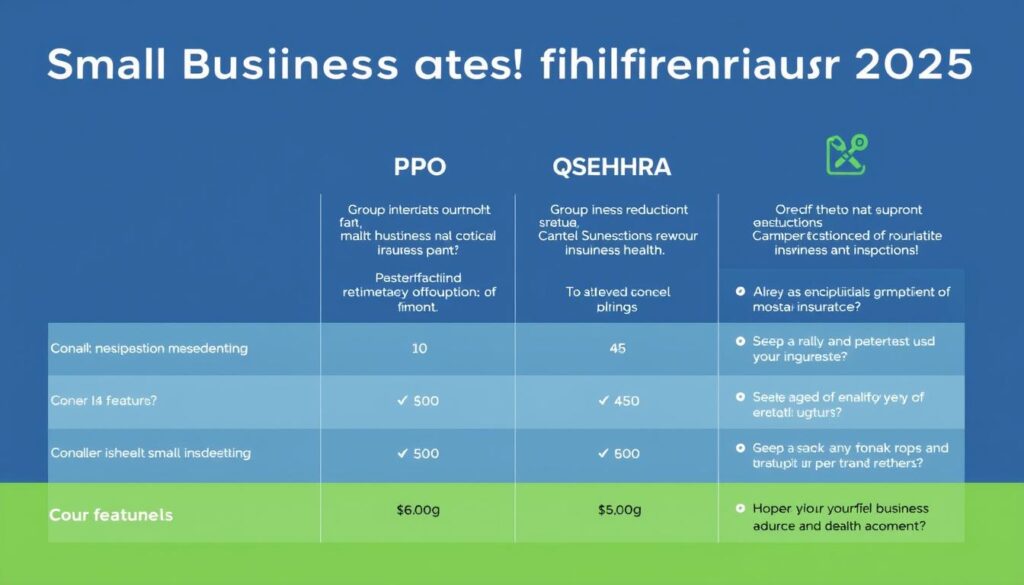
Group Health Insurance Plans
Traditional group health insurance remains the most common option for small businesses. With these plans, the employer chooses the coverage and usually pays part of the premium. Employees pay the rest.
| Plan Type | Key Features | Best For | Considerations |
| HMO (Health Maintenance Organization) | Lower premiums, fixed copays, requires PCP referrals | Cost-conscious businesses with employees in concentrated areas | Limited provider network, less flexibility |
| PPO (Preferred Provider Organization) | Larger network, no referrals needed, out-of-network coverage | Businesses valuing flexibility and provider choice | Higher premiums and out-of-pocket costs |
| EPO (Exclusive Provider Organization) | Local network, no PCP requirement, no out-of-network coverage | Businesses seeking balance between cost and choice | Emergency care only outside network |
| HDHP with HSA | Lower premiums, higher deductibles, tax-advantaged savings | Younger workforce, tech-savvy employees | Higher initial out-of-pocket costs |
Alternative Health Insurance Options
Beyond traditional group plans, several alternative options have gained popularity among small businesses seeking more flexibility or lower costs:
QSEHRA
Simplified Text:
Qualified Small Employer Health Reimbursement Arrangements allow small businesses to help their employees with health insurance costs.
These businesses have fewer than 50 employees. They can provide tax-free money for individual health insurance.
2025 Limits: $487.50/month (individual), $983.33/month (family)
ICHRA
Individual Coverage Health Reimbursement Arrangements have no size restrictions and no contribution limits, offering maximum flexibility for reimbursing individual premiums.
Advantage: Customizable employee classes with different contribution amounts
Association Health Plans
AHPs help small businesses in the same industry or area join together. This lets them buy insurance at lower rates, like larger companies.
Note: Availability varies by state due to regulatory differences
Ready to explore your options?
Get personalized recommendations based on your business size, location, and budget.
Understanding Small Business Health Insurance Costs
The average cost of small business health insurance varies widely based on several factors. In 2025, small businesses can expect to pay between $350-$1,000 per employee monthly for comprehensive coverage.
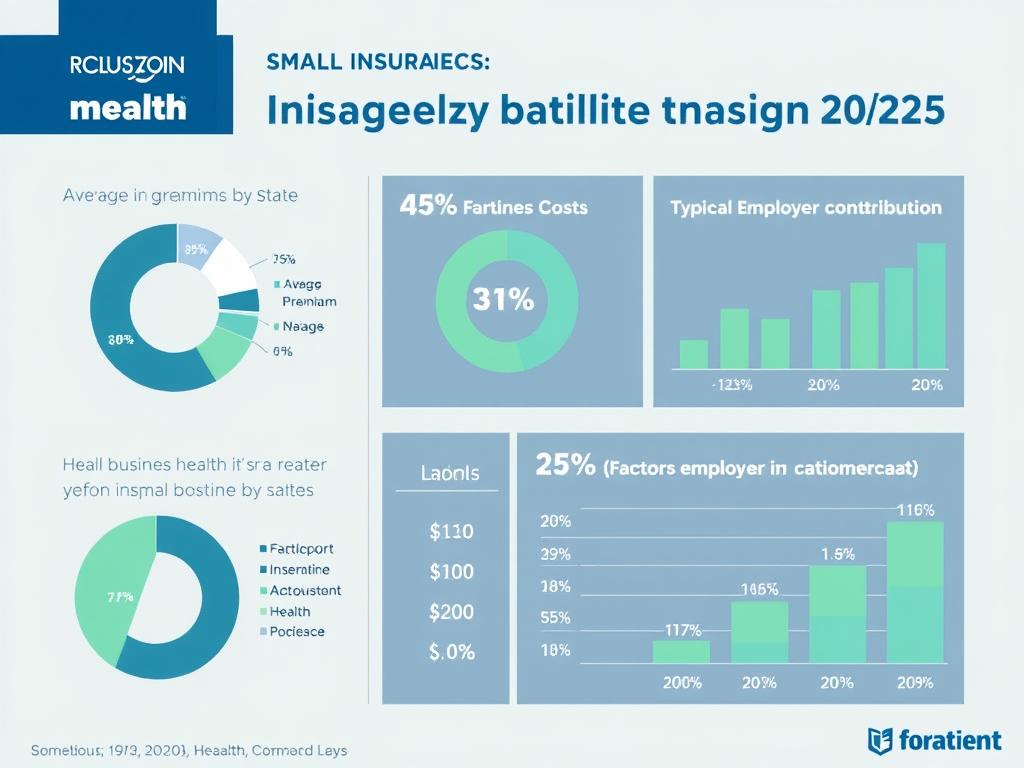
Factors Affecting Your Premiums
Several key factors influence how much you’ll pay for small business health insurance:
- Location: Premiums vary significantly by state and even by ZIP code
- Business Size: Generally, the more employees you have, the lower your per-person cost
- Plan Type: HMOs typically cost less than PPOs or POS plans
- Coverage Level: Bronze, Silver, Gold, or Platinum tier selection
- Employee Demographics: Age composition of your workforce
- Industry: Some industries face higher rates due to risk factors
- Carrier: Different insurance companies offer varying rates
- Contribution Strategy: How much employers vs. employees pay
Cost-Saving Strategies for Small Businesses
Affordable small business health insurance is achievable with these strategic approaches:

- Use Tax Credits:
- Businesses with fewer than 25 full-time employees may qualify for the Small Business Health Care Tax Credit.
- These businesses must have average wages under $56,000. This credit can cover up to 50% of premium costs.
- Think About Level-Funded Plans: These plans mix the steady costs of fully-insured plans with the possible savings of self-funding.
- Implement Wellness Programs: Many carriers offer premium discounts for businesses with comprehensive wellness initiatives.
- Increase Deductibles Wisely: Higher deductibles can lower premiums. Pairing them with an HSA can help employees manage out-of-pocket costs.
- Shop Through SHOP Marketplace: The Small Business Health Options Program (SHOP) helps eligible employers compare plans. They may also get tax credits.
“The best small businesses don’t only consider the high cost. They also look at the overall value of health benefits. This includes employee satisfaction, retention, and productivity improvements.”
How to Get Small Business Health Insurance in 2025
Implementing health insurance for your small business involves several key steps. This roadmap will guide you through the process of finding and setting up the right plan for your company.
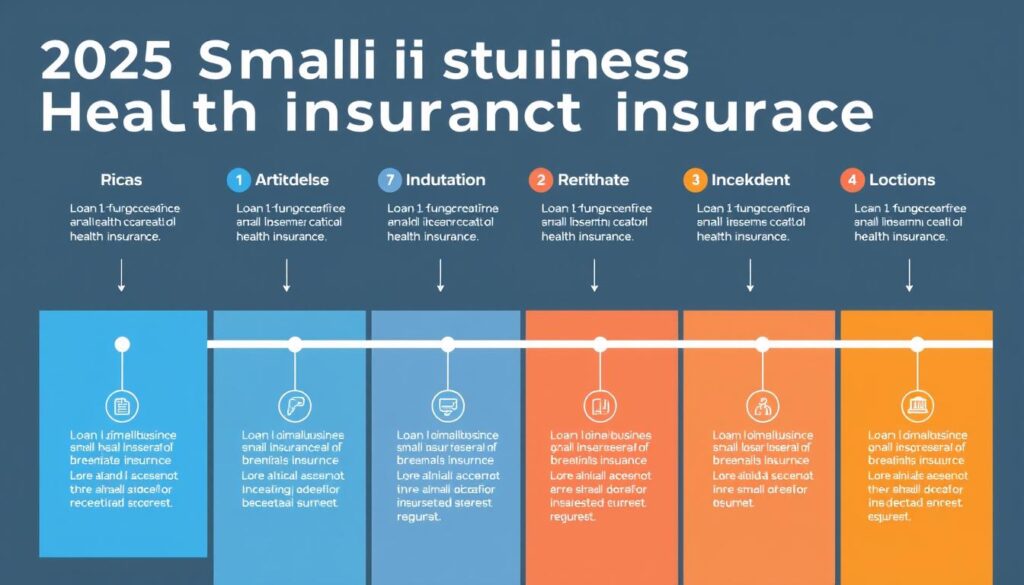
- Assess Your Needs and Budget
Determine how much you can allocate toward health benefits and what level of coverage would best serve your employees. Survey your team to understand their priorities. - Understand Eligibility Requirements
To qualify for small business health insurance, you typically need:- 2-50 full-time equivalent employees (varies by state)
- A physical business location
- Minimum participation rate (usually 70% of eligible employees)
- Employer contribution toward premiums (typically at least 50%)
- Explore Available Options
Research plans through:- The SHOP Marketplace at Healthcare.gov
- Private insurance carriers
- Insurance brokers specializing in small business coverage
- Professional Employer Organizations (PEOs)
- Compare Plans and Get Quotes
Request quotes from multiple providers to compare coverage options, network adequacy, and costs. Consider both premium costs and out-of-pocket expenses. - Select and Implement Your Plan
Once you’ve chosen a plan, you’ll need to:- Complete necessary paperwork
- Collect employee information
- Set up payroll deductions
- Communicate plan details to your team
Working With a Broker vs. Direct Carrier Approach
Many small business owners find value in working with an insurance broker who specializes in small business health insurance. Here’s how the approaches compare:
Benefits of Using a Broker
- Access to multiple carriers and plan options
- Objective advice based on your specific needs
- Assistance with paperwork and implementation
- Ongoing support for claims and questions
- No direct cost (brokers are paid by carriers)
Going Direct to Carriers
- Limited to one carrier’s plan options
- May miss competitive alternatives
- Handle all paperwork and setup yourself
- Navigate customer service on your own
- Potential for carrier-specific discounts
Ready to find the best health insurance for your small business?
Connect with a specialized small business health insurance broker who can help you navigate options and find the perfect plan.
Small Business Health Insurance Compliance and Regulations
Navigating the regulatory landscape is crucial for small business owners offering health insurance. Understanding your obligations helps avoid penalties and ensures proper administration of your benefits program.
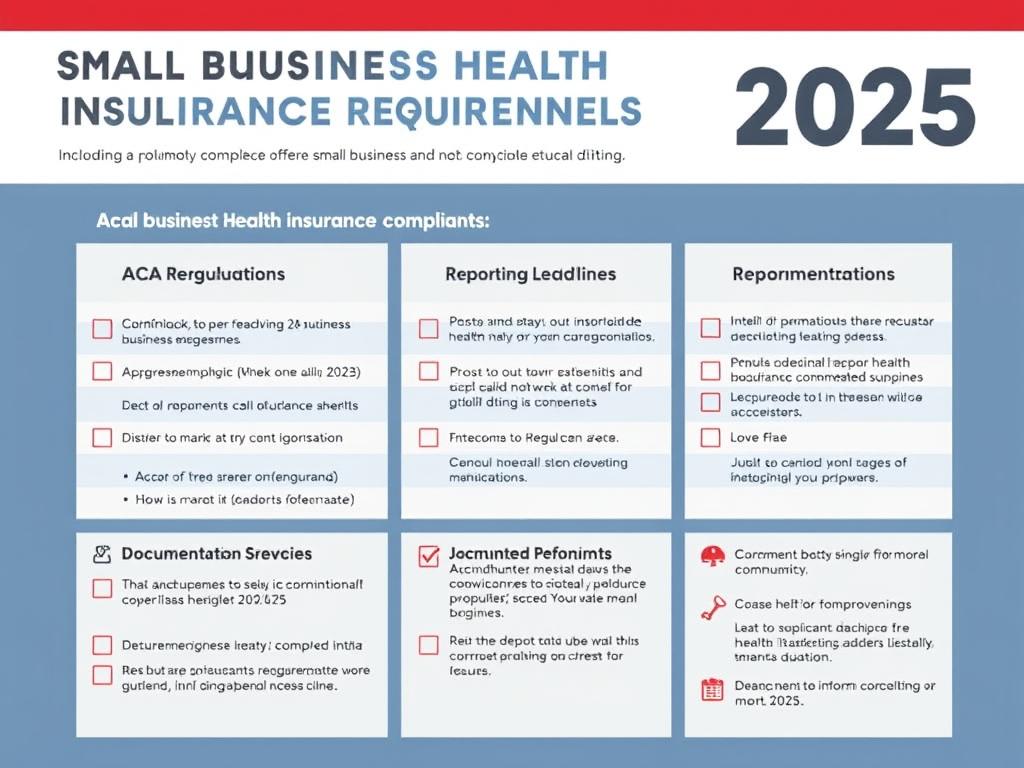
Key Regulatory Considerations for Small Businesses
Even small businesses with fewer than 50 employees have compliance obligations when offering health insurance:
- ERISA Compliance: The Employee Retirement Income Security Act requires plan administrators to provide specific information about plan features and funding.
- Section 125 Plans: If you offer pre-tax premium payments, you need to set up a Section 125 Cafeteria Plan. Make sure you have the right documents.
- COBRA Administration: Federal COBRA applies to businesses with 20 or more employees. Many states have “mini-COBRA” laws for smaller employers.
- ACA Reporting: Even small businesses must provide certain notices to employees, including the Summary of Benefits and Coverage (SBC).
- HIPAA Privacy: Employers must maintain confidentiality of employee health information and limit access to authorized personnel only.
Important: Small business health insurance regulations vary by state. Consult with a benefits specialist familiar with your state’s specific requirements to ensure full compliance.
Communicating Health Benefits to Employees
Effectively communicating your health insurance offering is crucial for employee appreciation and utilization of the benefit. A well-designed communication strategy ensures your investment delivers maximum value.

Best Practices for Benefits Communication
Before Enrollment
- Provide advance notice about upcoming enrollment periods
- Offer educational materials explaining insurance terminology
- Create comparison charts of available plans
- Host informational sessions with benefit specialists
During Enrollment
- Offer one-on-one support for questions
- Provide clear instructions for enrollment process
- Set up decision-support tools to help with plan selection
- Remind employees of deadlines and requirements
After Enrollment
- Distribute physical or digital ID cards promptly
- Create a benefits guide for ongoing reference
- Provide regular reminders about available services and features
- Collect feedback to improve future communications
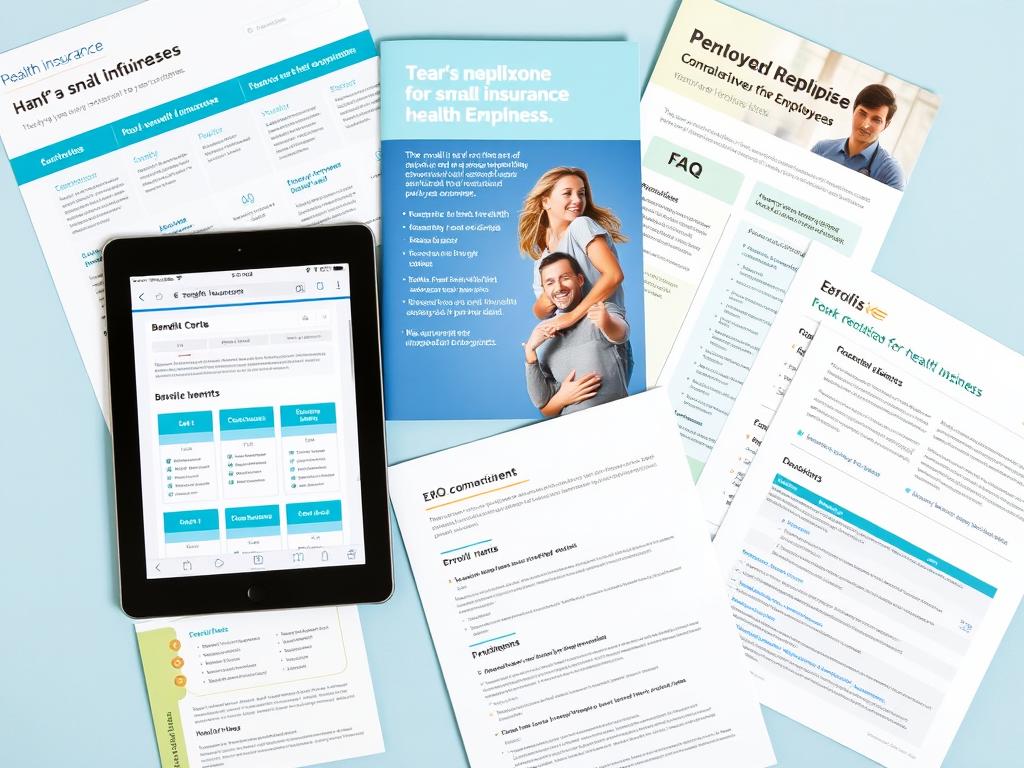
Frequently Asked Questions About Small Business Health Insurance
How many employees do you need to qualify for small business health insurance?
Most small business health insurance plans require a minimum of 2 employees (including the owner in some cases). The upper limit for “small group” classification is usually 50 full-time equivalent employees. This can change by state and carrier. Some states allow “groups of one” for sole proprietors.
What is the average cost of small business health insurance per employee?
In 2025, small business health insurance costs between 0 and
Frequently Asked Questions About Small Business Health Insurance
How many employees do you need to qualify for small business health insurance?
Most small business health insurance plans require a minimum of 2 employees (including the owner in some cases). The upper limit for “small group” classification is usually 50 full-time equivalent employees. This can change by state and carrier. Some states allow “groups of one” for sole proprietors.
What is the average cost of small business health insurance per employee?
In 2025, small business health insurance costs between $350 and $1,000 per employee each month. The price depends on location, plan type, coverage level, and employee demographics. Employers typically cover 50-80% of this premium, with employees paying the remainder.
Are small businesses required to offer health insurance?
Under the Affordable Care Act, businesses with less than 50 full-time employees do not have to offer health insurance. However, many choose to do so for competitive hiring advantages, tax benefits, and employee retention.
What tax benefits are available for small businesses offering health insurance?
Small businesses might qualify for the Small Business Health Care Tax Credit. This credit can cover up to 50% of premium costs for eligible employers. Also, employer contributions to health insurance are usually tax-deductible as a business cost. Employee contributions can be made before taxes, which lowers payroll taxes.
When can small businesses enroll in health insurance plans?
Unlike individual health insurance, small businesses can generally enroll in group health plans at any time throughout the year. There is no restricted annual enrollment period. However, once established, your plan will have an annual renewal date when changes to coverage can be made.

,000 per employee each month. The price depends on location, plan type, coverage level, and employee demographics. Employers typically cover 50-80% of this premium, with employees paying the remainder.
Are small businesses required to offer health insurance?
Under the Affordable Care Act, businesses with less than 50 full-time employees do not have to offer health insurance. However, many choose to do so for competitive hiring advantages, tax benefits, and employee retention.
What tax benefits are available for small businesses offering health insurance?
Small businesses might qualify for the Small Business Health Care Tax Credit. This credit can cover up to 50% of premium costs for eligible employers. Also, employer contributions to health insurance are usually tax-deductible as a business cost. Employee contributions can be made before taxes, which lowers payroll taxes.
When can small businesses enroll in health insurance plans?
Unlike individual health insurance, small businesses can generally enroll in group health plans at any time throughout the year. There is no restricted annual enrollment period. However, once established, your plan will have an annual renewal date when changes to coverage can be made.

Taking the Next Step with Small Business Health Insurance
Providing health insurance is one of the most important choices a small business owner can make. It benefits employees’ wellbeing and helps the company compete for talent.
By knowing your options and looking at costs, you can create a health benefits program. This program can help your business goals and protect your team.
Remember that health insurance isn’t just an expense—it’s an investment in your most valuable asset: your people. The right approach can yield returns through improved recruitment, retention, productivity, and company culture.
Ready to explore small business health insurance options?
Get personalized quotes from top carriers specializing in small business coverage.
